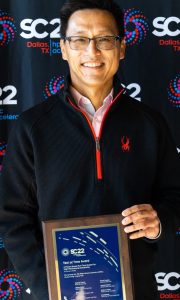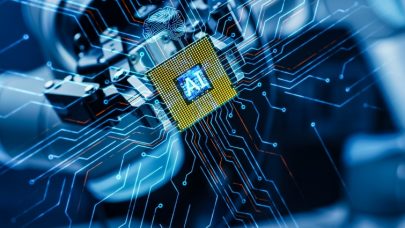Jan. 4, 2023 — Virginia Tech Professor Wu Feng was honored at the Supercomputing 2022 International Conference for High Performance Computing, Networking, Storage, and Analysis (SC22) in Dallas for his lasting contributions to the field.

Feng and co-author Chung-hsing Hsu received the Test of Time Award for their 2005 energy-efficient computing paper titled “A Power-Aware Run-Time System for High Performance Computing.” The award recognizes research that has had a significant historical impact in high-performance computing and that continues to contribute to shifting paradigms in the field.
Because not all innovation is readily embraced and paradigms are slow to move, this award brings with it a sense of redemption for Feng, who revealed his energy-efficient supercomputing project to a skeptical and derisive audience over 20 years ago.
At the ACM/IEEE Conference on Supercomputing in 2002, three years before the publication of his award-winning paper, Feng and his co-authors presented the paper “High-Density Computing: A 240-Processor Beowulf in One Cubic Meter.” This presentation introduced Green Destiny – a 240-node supercomputer that had the footprint of a telephone booth and consumed a mere 3.2 kilowatts of power, or the equivalent of two hairdryers.
“At the time, supercomputers were built like Formula 1 race cars,” Feng said. “They were very fast, but they were also inefficient, unreliable, and needed frequent maintenance. Green Destiny was built more like a Nissan 370Z sports car – more energy-efficient, more reliable, but still very fast.
“Unfortunately, in an era when speed in supercomputing was the priority in the field, suggesting that top-end speed might be even marginally compromised to save energy was practically heresy,” Feng said. “People were walking out during my talk, and by the end of it, there was even booing from the back of the room.”
Feng’s presentation was the subject of the 2002 Computerworld article “Green Destiny draws cheers and jeers.”
Green Destiny’s unpleasant reception in 2002 only served to further motivate Feng to devise a software system that prioritized energy efficiency without compromising the industry’s need for speed.
By the time the Supercomputing 2005 conference rolled around, Feng and his team had created a software system that was able to understand the difference between large blocks of non-computing operations, such as accessing memory or the network, and computing ones. This Power-Aware Run-Time (PART) software system would run on the “Formula 1” supercomputer and transform it into a more energy-efficient and reliable “Nissan 370Z” by automatically manipulating the speed of processing, as appropriate to a given task.
“The PART system intelligently understands when and how to take its foot off the accelerator, so to speak, to simultaneously deliver speed and energy efficiency,” Feng said. Ultimately, the ideas that originated in Green Destiny were made manifest in the PART system, which saves energy and maintains performance.

Today, Feng’s research is recognized as having changed high-performance computing trends. Contemporary supercomputers are approximately 500-fold more energy-efficient than they were in 2005 when Feng’s research was first published. Notably, the legacy of Feng’s work is evident in the energy-efficient Frontier, currently the world’s fastest supercomputer, located in Oak Ridge National Laboratory in Tennessee.
Feng joined Virginia Tech’s faculty in 2006 after completing his Ph.D. in computer science at the University of Illinois at Urbana-Champaign in 1996 and spending time between the professional world, government national labs, and higher education.
“I had been in academia before,” he said, “but what pushed me to come to Virginia Tech was the collaborative environment for research, particularly across disciplines like computer science and aerospace engineering for computational fluid dynamics or computer science and biology for bioinformatics.”
In addition to teaching in the departments of Computer Science, Electrical and Computer Engineering, and Biomedical Engineering and Mechanics, Feng directs the Synergy Lab at Virginia Tech, the Nation Science Foundation Center for Space, High-performance, and Resilient Computing at Virginia Tech, and the Center for Synergistic Environments for Experimental Computing. He also started Parallel Programming with Pictures, a program that introduces local middle and high school students from Southwest Virginia to the basics of parallel computing via pictures.
“To receive this award means that we’ve done our small part to facilitate a greater awareness to compute in a greener way,” Feng said. “We hope that this work and the overarching project continues to inspire research and innovation in green supercomputing.”
Source: Hannah Lee, Virginia Tech

























































